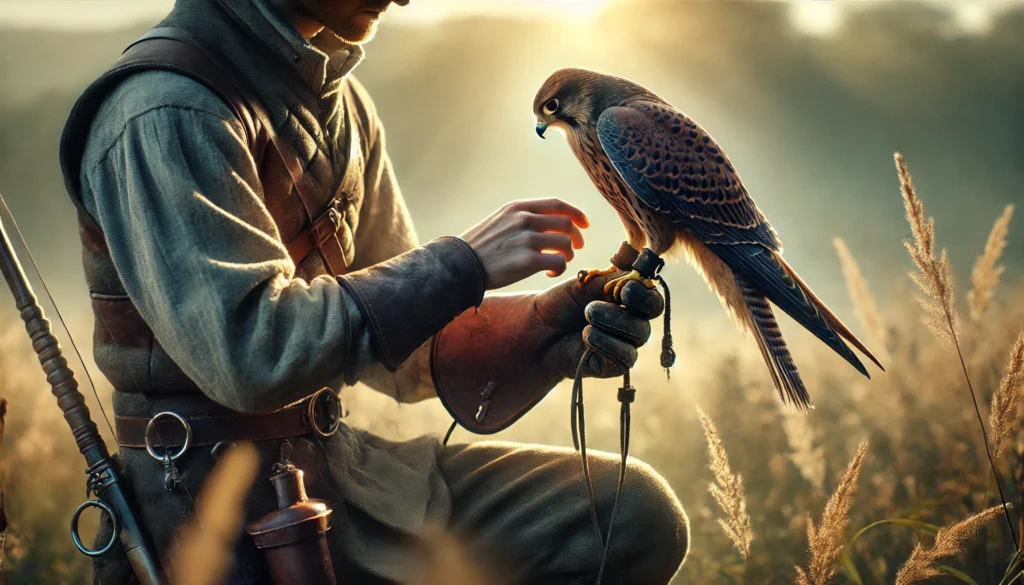Key Insights on Training Adult Falcons
- Understanding Falcon Behavior: Recognize that adult falcons might have established behaviors which could be challenging to change.
- Building Trust: Spend time building a relationship of trust and respect with the falcon. This is essential for successful training.
- Proper Equipment: Use suitable falconry gear, like gloves and hoods, to ensure safety and comfort for both the falcon and the trainer.
- Patience is Crucial: Training adult falcons requires patience. Progress might be slow, but consistency is key.
- Positive Reinforcement: Use rewards to encourage desired behaviors. Positive reinforcement helps in making the training session more effective.
- Health Check: Regular health check-ups are vital. A healthy falcon will respond better to training.
- Training Environment: Provide a calm and distraction-free environment to help the falcon focus during training sessions.
- Gradual Introduction: Gradually introduce the falcon to training routines. Avoid overwhelming the bird with too many new experiences at once.
- Observe and Adapt: Pay attention to the falcon’s responses and be ready to adapt your training methods accordingly.
- Knowledge of Falconry: Continually educate yourself on falconry techniques and best practices to enhance your training skills.
Mastering the Art of Training Adult Falcons: Unleash Their Potential!
At Learn Falconry, we know that training adult falcons can feel a bit like trying to harness the power of the wild Irish winds’it’s intense, challenging, and, oh boy, rewarding! Just as those winds can powerfully shape the lush, rolling hills of Ireland, you can guide your falcon into unlocking its true capabilities. If you’re enthusiastic about falconry but concerned that your adult falcon may be a bit… stubborn, you’re in the right place.
This article contains fascinating insights and expert tips on the intricate art of falcon handling and training. Think of it like this: a seasoned fisherman in Ireland doesn’t just catch fish; he understands the movement of the water, the behavior of the fish, and the rhythm of the breeze. Similarly, to train an adult falcon, you must grasp its unique personality, instincts, and demeanor.
So, why should you keep reading? We’ve designed this engaging guide to make sure you don’t miss a single beat in your falconry journey. It’s packed with practical advice, relatable stories, and proven techniques’all crafted to help you and your feathered friend reach new heights together. Ready to spread your wings and soar into the majestic world of adult falcon training? Dive into the article and discover how you can make the winds of change work in your favor!
Mastering Adult Falcon Training: Techniques for Mature Falcons
When it comes to adult falcon training, there are many fascinating techniques and strategies to consider. Training a mature falcon involves different methods than training younger birds, as adult falcons have developed behaviors and preferences. This section will guide you through various falcon training techniques, offering insight and tips to help you succeed.
Introduction to Adult Falcon Training
Training an adult falcon requires patience, consistency, and a deep understanding of falcon behavior. Unlike younger falcons, mature birds may already have established habits, making training both a challenge and an opportunity to bond with your falcon through trust-building activities.
Essential Falconry Equipment
Before diving into the various training techniques, ensuring that you have the necessary equipment is crucial. Tools like hoods, jesses, and perches are fundamental in managing and training your falcon. You can learn more about these essential items on our falconry equipment page.
Key Falcon Training Techniques
- Positive Reinforcement Techniques:
- Using rewards, such as food or treats, to encourage desired behaviors. This technique is essential for building trust and encouraging cooperation from your mature falcon. For more detailed methods, check out our positive reinforcement techniques.
- Clicker Training for Falcons:
- Utilize a clicker to mark desired behaviors, followed by a reward. Clicker training can help communicate clearly with your falcon, making it a powerful tool for training adult birds. Learn more about this method here.
- Creance Training:
- A long line, or creance, allows your falcon to fly while still under your control. This technique is especially useful for recall training. For tips on how to perform successful creance training, visit our creance training page.
- Free Flight Techniques:
- Once your falcon is comfortable with basic commands and recall, free flight training can begin. This step allows your falcon to fly freely while still responding to your commands. For advanced techniques, explore our free flight techniques.
- Lure Training:
- The use of lures can simulate hunting scenarios, helping your falcon practice and hone its natural instincts. Detailed methods of lure flying can be found on our lure flying techniques page.
Tailoring Training for Different Falcon Species
Different falcon species may require tailored training techniques to cater to their unique characteristics. Whether you have a Peregrine Falcon, a Gyrfalcon, or an American Kestrel, understanding their specific needs will make your training more effective. Explore the unique traits and training tips for various species of falcons on our species of falcons page.
Overcoming Training Challenges
Training mature falcons can come with its set of challenges. It’s essential to remain patient and adaptable, as each falcon is different. Learning how to handle and adapt to these challenges is crucial for successful training. Discover ways to overcome common training obstacles on our training challenges page.
Health and Nutrition for Trained Falcons
Maintaining the health and nutrition of your falcon is vital for successful training. A well-fed, healthy falcon is more responsive and energetic, ready to take part in training sessions. Gain insights into proper nutrition and health care for your falcon by visiting our falcon health and nutrition section.
Legal Considerations in Falconry
As a falconer, it is crucial to be aware of the legal aspects surrounding falconry practice. Adhering to licensing requirements and regulations ensures that your training activities are compliant and ethical. For more information on legal considerations, you can visit our legal aspects of falconry page.
Lastly, if you’re ready to dive deeper into advanced training techniques, explore our advanced training methods to take your falconry skills to the next level.
By mastering these falcon training techniques and understanding the specific needs of your mature falcon, you’ll be on your way to building a strong, cooperative bond with your magnificent bird of prey. Happy training!
Comprehensive Guide to Training Adult Falcons
Understanding the art of training adult falcons is an exciting and challenging task. Falcons, particularly adult ones, require a detailed approach to training, specific equipment, and following strict licensing guidelines. Here we’ll explore the key aspects of training adult falcons to help you become successful in falconry.
Falconry License Requirements
To start training adult falcons, it’s essential to understand the different levels of falconry licenses and their requirements.
License Levels and Requirements:
| License Level | Age Requirement | Experience Requirement |
|---|---|---|
| Apprentice | 12-17 years | Supervised by General or Master Falconer |
| General | 18+ years | 2 years as an Apprentice Falconer |
| Master | 18+ years | 5 years as a General Falconer |
Falconry Training Programs and Costs
Training programs vary, but some offer immersive, structured courses designed to equip aspiring falconers with the necessary skills.
Example Program:
| Program Name | Duration | Cost | Includes |
|---|---|---|---|
| Peregrine Falcon Hybrid Forest Therapy Guide Training | 6 months | $3350 USD | 4-day immersion ($495), excluding lodging, meals, transportation |
Falconry Hunting Seasons
Falcony hunting seasons can vary greatly depending on the species of falcon and the region. It is crucial to stay updated with local wildlife agencies to know the appropriate seasons.
Hunting Seasons Overview:
- Small Game Hunts: Typically in the fall and winter months.
- Migratory Game Birds: Dependent on migration patterns, often regulated by specific dates set by the authorities.
Essential Falconry Equipment and Facilities
Training falcons requires specific equipment to ensure both the falconer and the falcon’s safety and success.
| Equipment | Description |
|---|---|
| Hoods | Cover the falcon’s eyes to keep it calm and focused |
| Bells | Attaches to legs to help locate the falcon |
| Jesses | Leather straps attached to the falcon’s legs |
| Telemetry | GPS system for tracking the falcon |
Falconers must also have adequate facilities, known as MEWS, that meet specific standards to house their birds.
Falconry Training Techniques
Training falcons involves several techniques, ensuring that the bird is acclimated to its environment and the training equipment.
Key Training Steps:
- Acclimatization: Getting the falcon comfortable with humans and the surrounding environment.
- Equipment Training: Introducing the falcon to hood, jesses, and telemetry.
- Recall Training: Teaching the falcon to return when called.
Licensing Fees and Duration
Obtaining and maintaining a falconry license involves understanding the associated costs and validities.
License Costs and Duration:
| License Type | Cost | Validity |
|---|---|---|
| Apprentice | $40 | 5 years |
| General | $40 | 5 years |
| Master | $40 | 5 years |
Training adult falcons is a rewarding pursuit that balances strict regulations, proper equipment, and dedicated training programs. By understanding these key components, aspiring falconers can navigate the world of falconry with confidence.
Final Thoughts on Training Adult Falcons
Training adult falcons is a fascinating and rewarding journey that requires dedication, patience, and a deep understanding of both the birds and the intricate art of falconry. From various levels of training programs to obtaining necessary licenses, each step ensures that the falconer and the raptor can work together harmoniously.
Key points to remember include:
- Training Programs: Programs like the Peregrine Falcon Hybrid Forest Therapy Guide Training can provide specialized knowledge and skills.
- Licenses and Requirements: Falconry licenses have multiple levels such as Apprentice, General, and Master, each requiring certain years of experience and exams.
- Equipment and Facilities: Essential gear includes hoods, bells, jesses, and telemetry transmitters, and facilities should meet specific standards.
- Training Process: Thorough acclimatization to human interaction and equipment use is crucial for successful training.
- Hunting Seasons and Legalities: Falconers must be aware of varying hunting seasons and legal regulations regarding game.
Becoming proficient in training adult falcons involves a considerable investment of time and resources but offers unique and enriching rewards. Whether you aim to master different training levels or simply wish to deepen your appreciation for these majestic birds, the skills and knowledge gained in the process are truly invaluable. Happy training, and remember to cherish every moment spent with your incredible feathered companions!



